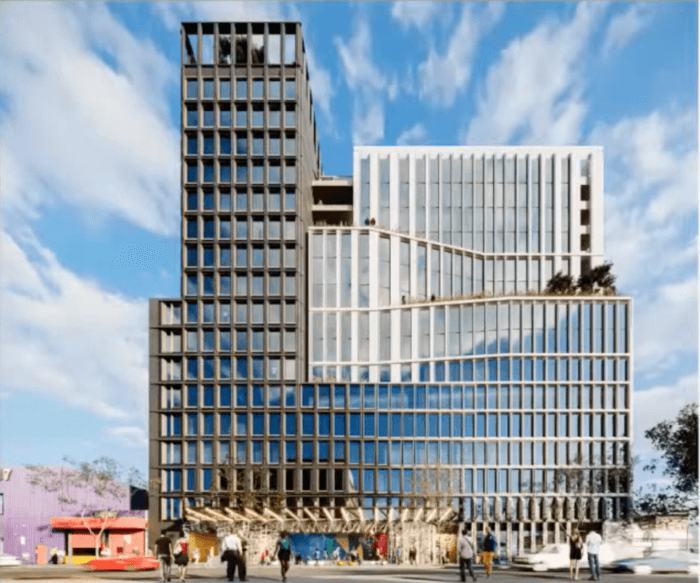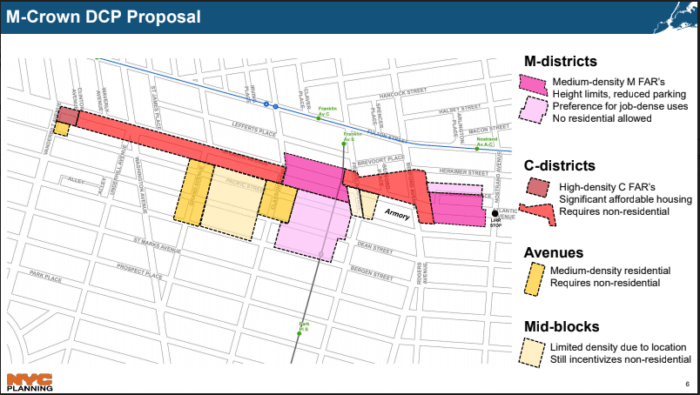The New York City Council voted 48-1 to approve a pair of new buildings on Atlantic Avenue on Thursday, a move Brooklyn Councilmember Crystal Hudson said would change the game for affordable housing in future rezonings.
Hudson initially said that she could not support developers’ proposals for mixed-use high rises at 870-880 Atlantic Avenue and 1034-1047 Atlantic Avenue in Prospect Heights, announcing just days into her tenure on the Council that she would not vote to approve the projects since she had not been able to take part in the Uniform Land Use Review Process for the buildings from the start, since most of the process occurred before she took office.
But in negotiations with the developers, Y&T Development and EMP Capital, Hudson managed to secure more affordable apartments than are required under the city’s Mandatory Inclusionary Housing program, which dictates that all new development requiring a rezoning — which the Atlantic Avenue projects did — has to include at least 25 percent affordable units. As of Thursday’s vote in the Council, both companies had agreed to 35 percent affordable units, or a total of about 150 apartments between the two buildings.

Most of those units will be rented out to tenants making 40 to 60 percent of the Area Median Income, between $53,360 and $80,040 for a family of four, with a smaller number of apartments available at 80 percent AMI, or $120,060 for a family of four, Hudson said.
“For too long, developers have driven the land use and planning process in this city,” Hudson said. “They’ve convinced New Yorkers that affordability quotas and community demands will stifle development in a time when we need to build more to confront the growing affordability and housing shortage we’re facing. However, the truth is developers can stand to do much more. They can exceed the MIH minimums that do not meet the needs of the majority of working New Yorkers, and they can commit to improving public infrastructure in the communities they purport to serve.”
The median household income in Brooklyn Community Board 8, where the two buildings will stand, is just $61,213 per year, according to city data, and one-quarter of households make less than 30 percent AMI — or less than about $40,000 for a family of four and $28,000 for an individual.
With a comparatively low number of apartments on the market available to low-income tenants, and rents rising across the city, affordable housing is an increasingly-precious commodity, and Mandatory Inclusionary Housing is one of the only ways the city can ensure caps on rent, though Hudson noted that even those limits are usually not low enough.
“Today, we set a new floor for potential projects across the City, and set a new standard that will ensure we create more homes for low and moderate-income earning New Yorkers, not just the ones with the deepest pockets,” she said.

The city has also committed to a long-discussed rezoning of the Atlantic Avenue corridor, which Hudson said would be “bottom-up,” taking into consideration the ideas and needs of the neighborhood, rather than taking the lead of a developer. During a Friday tour of the area with Department of City Planning head Dan Garadnick, Hudson emphasized the importance of maintaining space for existing industrial tenants, not just flooding the area with new residential development, Politico reported. The so-called “M-Crown” proposal has previously garnered support from Hudson’s predecessor, Laurie Cumbo, and then-borough president Eric Adams.
The city’s agreement to study the rezoning will “help address the community-identified district needs of the area,” said Rafael Salamanca Jr, chair of the Council’s Land Use Committee.
“Unprecedented in its structuring to ensure a level of affordability, the agreements struck between the developers of 870-888 Atlantic Avenue and 1034-1042 Atlantic Avenue and Council Member Hudson represent first steps towards realizing a vision for more affordable housing, job opportunities and protections for both tenants and homeowners in Community Board #8,” said board president Irsa Witherspoon, in a release. “With a comprehensive plan, the community board looks forward to fostering opportunities with community stakeholders that closely meet the needs of both recent and current residents of our communities.”

























